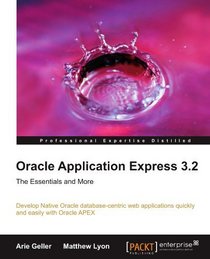Search -
Oracle Application Express 3.2: The Essentials and More
Oracle Application Express 32 The Essentials and More
Author:
Develop Native Oracle database-centric web applications quickly and easily with Oracle APEX
Author:
Develop Native Oracle database-centric web applications quickly and easily with Oracle APEX
- Grasp the principles behind APEX to develop efficient and optimized data-centric native web applications, for the Oracle environment
- Gain a better understanding of the major principles and building blocks of APEX, like the IDE and i... more »
- Review APEX-related technologies like HTML and the DOM, CSS, and JavaScript, which will help you to develop better, richer, and more efficient APEX applications
- Learn to Globalize APEX applications, including Right-To-Left support
- This book covers APEX version 3.2, but the information is broadly applicable to all 3.x versions
- Fully utilize the Web development aspects of APEX by getting familiar with necessary skills such as HTML, the DOM, CSS, and JavaScript
- Understand important concepts of APEX such as Session State, Substitution Strings, the Shortcuts mechanism, and more
- Create the APEX application building blocks, like pages, items, processes, data validation, shared components, and others, and use them to implement the User Interface and the application (business) logic
- Generate APEX Forms and modify them to your needs using the APEX wizards
- Build, display, and validate a Tabular Form, manually as well as using a wizard
- Create and modify Interactive Reports
- Understand the AJAX concepts, such as XMLHttpRequest, communication, and data format, in order to enhance users' experience, and to optimize application performance
- Secure your applications using Authentication Schemes, Authorization Schemes, Session State Protection, and Security Attributes
- Build localized and/or multi-lingual applications using the APEX Globalization support, including the APEX built-in translation mechanism
- Convert Microsoft Access and Oracle Forms applications to APEX applications
- Explore APEX SQL Workshop via its modules such as Object Browser, SQL Commands, SQL Scripts, and Query Builder, and learn how to use them to build the database infrastructure and support for your application
- Implement AJAX in APEX with the help of detailed working examples
ISBN-13: 9781847194527
ISBN-10: 1847194524
Publication Date: 6/1/2010
Pages: 644
Edition: 1st New edition
Rating: ?
ISBN-10: 1847194524
Publication Date: 6/1/2010
Pages: 644
Edition: 1st New edition
Rating: ?
0 stars, based on 0 rating
Genres:
- Computers & Technology >> Databases & Big Data >> Database Management Systems
- Computers & Technology >> General




